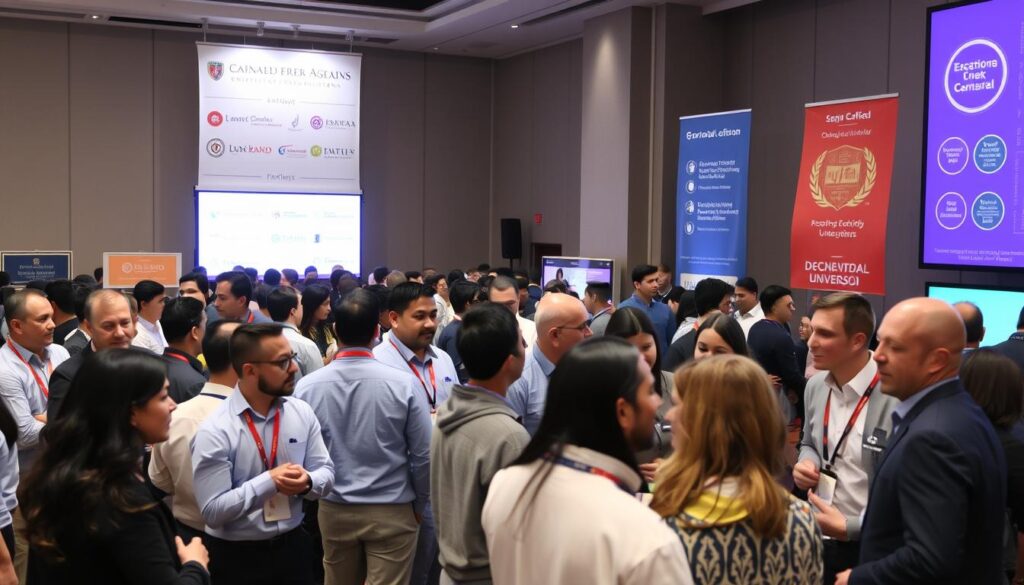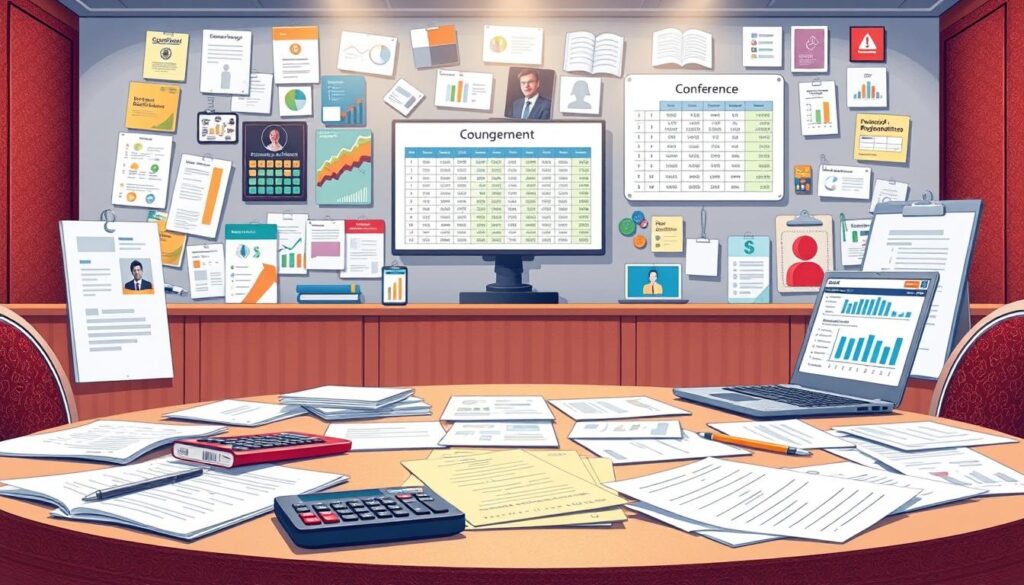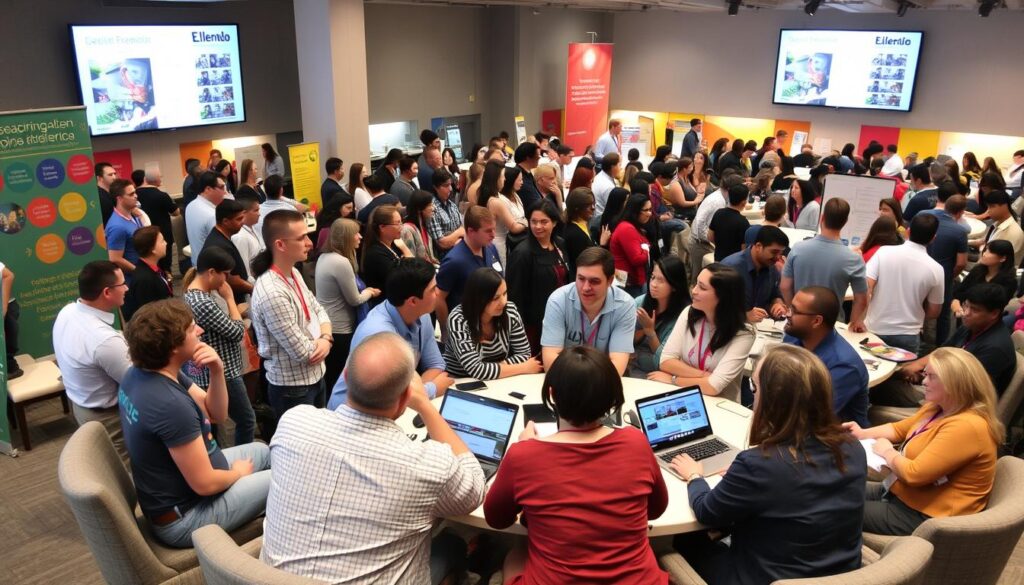Choosing the right educational conference can change your career. It helps educators grow, meet new people, and learn the latest in education. Whether you teach in K-12 or work in higher education, the right conference offers great learning chances.
It brings new ideas and ways to work together. This can make your teaching better and improve your students’ lives.
Key Takeaways
- Educational conferences offer a wealth of professional development opportunities for educators to expand their knowledge and skills.
- Identifying your learning objectives and career development needs can help you select the most relevant conference for your growth.
- Researching the reputation and organizing body of a conference can ensure you attend a high-quality event.
- Evaluating the conference program, speaker lineup, and session topics can help you maximize your learning experience.
- Considering the conference location, costs, and networking opportunities can help you make an informed decision.
Understand Your Professional Goals
Before picking a conference, know what you want to achieve. Think about your career level, skills to learn, and knowledge to gain. This helps you find the best conferences for growth and learning.
Identify Your Learning Objectives
Do you want to learn more about your field, improve your skills, or lead better? Maybe you want to know the latest trends and best practices. Knowing what you need will help you choose the right conferences.
Evaluate Your Career Development Needs
Think about how a conference can help your career. You might want to work with different teams, learn new tech, or find mentors. Choosing conferences that match your career goals will make your time and money worth it.
| Short-Term Goals | Long-Term Goals |
|---|---|
|
|
“Attending professional events and joining professional groups on platforms like LinkedIn can help in expanding professional networks.”
Research the Conference Reputation

Choosing an educational conference to attend requires careful research. You need to look into the event’s reputation, the quality of past experiences, and its credibility. This helps you decide if the conference is worth your time and money.
Assess the Organizing Body
First, check who is organizing the conference. Good events are often run by respected professional groups, educational bodies, or publications. Look for signs of industry recognition, academic credibility, and a solid event history. This shows the organizers know how to host quality conferences.
Review Past Attendee Feedback
Next, find out what past attendees say about the conference. You can ask your colleagues or search online for past attendee feedback. This feedback can tell you about the speaker quality, session relevance, and overall attendee satisfaction. Trustworthy conference reviews and word-of-mouth recommendations are great indicators of the event’s reputation.
By doing your homework on the conference’s reputation, you can make sure it meets your professional goals and learning objectives. This way, you’ll get the most out of your time and investment.
Evaluate the Conference Program

Choosing the right educational conference is key for your growth. Look closely at the program. Check the speaker lineup, session topics, and formats. Make sure they match your learning goals and offer the content you need.
Examine the Speaker Lineup
Find a conference with top industry leaders and experts. They should share their cutting-edge research and best practices. Their presentations should be engaging and full of insights.
Analyze Session Topics and Formats
Review the session topics to see if they match your goals. Look for a mix of educational content and interdisciplinary sessions. Also, check the variety of formats like interactive workshops and keynote presentations. This ensures a dynamic learning experience.
Choose a conference with diverse professional development tracks. This includes career-focused tracks and technology-focused tracks. It should also have student-focused tracks and equity-focused tracks for everyone’s needs.
“The quality of the speaker lineup and the relevance of the session topics are key indicators of the overall educational content and subject matter expertise that a conference can offer.”
By carefully looking at the conference program, you can find the right educational conference. It should offer networking events and interactive workshops to help you reach your goals.
Consider the Educational Conference Location
When picking an educational conference, the location matters a lot. The travel accessibility, accommodation options, and local amenities greatly affect your experience. They help you fully enjoy the event.
The venue facilities and event atmosphere set the mood for the whole event. A lively city with lots of cultural experiences and networking opportunities can make the conference unforgettable. But, a hard-to-reach location might make it less worth it, affecting cost-effectiveness and environmental sustainability.
Look at the transportation options like airports, train stations, or public transit. Check out the accommodation options like hotels, hostels, or Airbnb. Also, see what local amenities are there, like restaurants or cultural spots.
By doing your homework on the location, you can find a place that fits your needs. This way, you’ll have a great time at the educational event.
Factor in the Conference Costs

When planning to attend an educational conference, it’s key to think about the costs. This includes the registration fees and any extra expenses for travel and accommodation. By doing a detailed cost-benefit analysis, you can make sure the conference’s value is worth the money.
Registration Fees
Conference registration fees vary a lot. They can be from $200 to $1,500 or more. Smaller or local conferences usually cost between $200 and $500. Mid-sized conferences might cost $500 to $1,000. Large or top conferences can cost $1,000 to $1,500 or more.
Travel and Accommodation Expenses
You also need to think about travel and accommodation costs. These can add up, especially if the conference is far away. Look for early-bird discounts, group rates, travel subsidies, lodging deals, and event packages to save money.
By planning your budget well, you can get the most out of your investment. Look for funding sources like employer support or professional development budgets. Also, find cost-effective strategies like sponsorship opportunities or early-bird registration discounts. With a good budget plan, you can make sure the benefits of the conference, like networking and professional growth, are worth the cost.
“The average per-person cost for a conference can range from $500 to $2,500, with total conference costs ranging from $150,000 up to over $3,000,000 based on factors like size, location, and duration.”
Assess Networking Opportunities
Going to an educational conference is more than just learning new things. It’s a chance to grow your professional network. By looking at the networking chances at a conference, you can get the most out of it. You can also make connections that help your career.
Explore Attendee Profiles
Start by checking out who will be there. Look at the types of people, jobs, and industries. This helps you find others who might share your interests or goals.
Look for Structured Networking Events
Good networking needs a plan. Look for events like socials, workshops, or group meetups. These events help you meet people and make lasting connections.
Make networking a big part of your conference plan. This way, you can learn from others, work together, and move your career forward. Using the networking chances at a conference can really change your career and industry connections.
“Networking at academic conferences facilitates collaboration and knowledge exchange, leading to joint research projects, publications, and grant proposals.”
Educational Conference

Educational conferences are key for professional growth. They bring together educators, admins, and experts to share knowledge. These events offer a wide range of sessions and networking events for all.
By engaging with the content and networking with peers, attendees can improve their skills. They learn about the latest innovations and trends. This helps them make a difference in their classrooms and communities.
The Innovative School Summit is a great example. It caters to many educational professionals. Renowned speakers like Ron Clark and Dr. Debbie Silver share their insights on topics like preventing dropouts and improving school culture.
Attendees love the informative and inspiring sessions. They learn new strategies to tackle challenges like social media and self-injury. They also learn how to support students with diverse needs and promote ethical practices.
The International Conference on Education (ICEDU) series is another top event. It brings together educators, researchers, and policymakers. With over 1800+ participants from more than 60 countries, it’s a hub for collaboration and innovation in education.
Whether it’s the Innovative School Summit or the ICEDU series, these conferences are vital. They offer chances for skill-building, leadership development, and personal growth. This empowers professionals to positively impact students and the education community.
Also Read : How Teacher Training Workshops Can Transform Student Outcomes
Conclusion
Choosing the right educational conference is a big decision. You need to think about your goals, the conference’s reputation, and what it offers. Also, consider the location, costs, and networking chances.
By doing this, you can find a conference that fits your needs. It will help you grow professionally and learn new things. This can really help you make a difference in education.
Going to educational conferences is important for lifelong learning. They offer many ways to learn, like presentations, workshops, and networking. These experiences help everyone in education grow and improve together.
Whether you teach, manage schools, do research, or work with technology, picking the right conference is key. It can give you the tools and connections you need to innovate and collaborate. By focusing on your growth and taking part in these events, you can keep making a positive impact on education.
